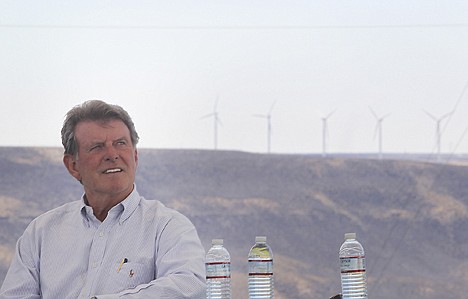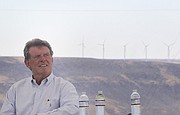Winds of change?
John Miller | Hagadone News Network | UPDATED 15 years, 5 months AGO
BOISE - The wind always seems to blow on the Snake River plain, keeping this high-desert landscape of sage, potatoes and sugarbeet plants forever in motion.
Still, General Electric Co. executives said the consistent gusts weren't enough for them to take a majority stake in Idaho's largest wind farm, a 122-turbine, $500 million complex due to produce enough electricity for some 43,000 homes.
That took cash - specifically, the promise of more than $100 million in grants from a U.S. Department of Treasury program that's pumped $5.1 billion into the nation's renewable energy projects in the last 18 months. It's helped kickstart wind farms in California's mountains, geothermal stations that tap boiling water beneath Nevada's desert, even solar equipment at a Wisconsin cranberry marsh.
Part of the 2009 federal stimulus, it came as financing evaporated after the 2008 global financial crisis.
Grant recipients say risk-leery bankers have grown more willing to give them money, knowing that renewable developers will quickly get 30 percent of eligible capital costs back, to reduce their debts.
But the grant program expires this year, so energy developers and lawmakers are pushing Congress to extend it until 2012, though they fear election-year politics and possible cost concerns will be a roadblock.
Failure won't kill renewable energy development, but advocates say wind, geothermal and solar power projects would likely slow.
"Industry is already challenged with difficulties in getting power contracts at a price that makes sense," said Alex Urquhart, president and chief executive officer of GE Energy Financial Services, before touring his new Idaho project. "If you take away the grant, you further dampen the market, you add cost to projects that may already be challenged."
For years, the U.S. government steered cash to renewable energy development by offering tax credits.
But when financial markets collapsed in 2008, banks and other investors no longer had an appetite for those, leading Congress and President Barack Obama to approve the cash grants with the American Recovery and Reinvestment Act of 2009.
In April, the Lawrence Berkeley National Laboratory in California said wind projects that may have been enabled by the stimulus grants created 51,600 construction jobs and 3,860 permanent jobs. Nearly two-thirds of wind projects and all geothermal plants built in 2009 took the grants.
GE's project in Idaho expects to create 175 construction jobs and 25 permanent jobs.
"The Treasury grant has been hugely important to date in bridging the gap in financing, as the economy took a nose dive," said Alex Klein, a consultant at IHS Emerging Energy Research in Cambridge, Mass.
Fred Prehn, owner of Prehn Cranberry Co. about 100 miles northwest of Madison, Wis.., is just now applying for his third Treasury grant. He's already received two, totaling about $93,000, to install solar equipment and a wind turbine for his 160-acre marsh where he grows 5 million pounds of berries annually.
Prehn's third will pay about $110,000 for a second wind turbine that will power his pumps and ship electricity back to his local utility to defray costs. The federal grant was critical in convincing bankers to loan him the money for his latest turbine, he said.
"Otherwise, it would have never happened," Prehn said. "People think, 'This is just for the big guys.' It isn't. It's for everybody. Grab your piece of it. But you've got to hurry up."
With the grants expiring this year, a group of U.S. senators including Maria Cantwell, D-Wash., and George LeMieux, R-Fla., are pushing to extend the program two years. U.S. Rep. Sander Levin, D-Mich., introduced a draft bill in the House Ways and Means Committee with similar provisions.
U.S. Sen. Mike Crapo, R-Idaho, is optimistic an extension could clear the Senate Finance Committee with bipartisan backing - despite deficit concerns.
"The majority of even the conservatives in Congress believe that our energy policy, or lack thereof, is such a serious threat to our economic stability that it justifies congressional support," Crapo said Friday.
"Our sense is, it will be part of the September agenda," added Derek Schlickeisen, a spokesman for U.S. Rep. Earl Blumenauer, D-Oregon and a backer of the House measure.
But Karl Gawell, the Geothermal Energy Association's executive director in Washington, D.C., said nothing is assured. He fears bad blood between the respective parties in the nation's capital could color the debate when lawmakers return in mid-September.
"It's the politics of Washington," Gawell said. "It doesn't appear to most people that any significant legislation is going be able to pass, in the Senate, in particular."
So far, most grants have gone to wind projects like GE's - largely because their gleaming white towers and spinning blades go up quickly and can meet federal requirements that projects be under construction this year. Solar, including at an animal clinic in Florida, a New Jersey tire shop and a Texas cattle feed maker, accounts for 5 percent of recipients.
Geothermal power developers got only 3 percent, or $154 million. But those that got cash called the grants a lifeline at a time when traditional investors had fled or demanded "credit-card rates" for loans. Vancouver, British Columbia-based Nevada Geothermal Inc. got a $57.9 million grant - cash to pay down high-interest debt on its power plant in northern Nevada, said spokesman Paul Mitchell.
And U.S. Geothermal Inc., in Boise, Idaho, expects a $34 million grant for its eastern Oregon power plant. If Congress extends the program, Chief Executive Officer Dan Kunz said it could help him build or expand projects in Idaho and Nevada.
"Maybe three good sized power plants could be brought on line, by this company alone," Kunz said.
ARTICLES BY JOHN MILLER
Governor wins with exchange, tax repeal plan
BOISE (AP) — After the 2013 session ended, Gov. C.L. “Butch” Otter joked that he grew confident his proposal for a state-based health insurance exchange would succeed only “when that bill hit my desk.”
Idaho lawmakers adjourn, settle education budget
BOISE (AP) — The 2013 Idaho Legislature adjourned Thursday, nearly a week later than expected, after lawmakers finally completed the $1.3 billion education budget.
Idaho House panel backs state insurance exchange
BOISE (AP) — The House Health and Welfare Committee backed a state-based, nonprofit insurance exchange Thursday, conceding that it wasn’t a perfect solution, but it was better than merely accepting a version run from Washington, D.C.



